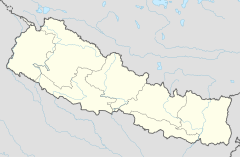
Parashurama, also referred to as Rama Jamadagnya, Rama Bhargava and Virarama, is the sixth avatar among the Dashavatara of the preserver god Vishnu in Hinduism. He is believed to be one of the Chiranjivis (Immortals), who will appear at the end of the Kali Yuga to be the guru of Vishnu's tenth and last incarnation, Kalki.

Badrinath is a town and nagar panchayat in Chamoli district in the state of Uttarakhand, India. It is a Hindu holy place, and is one of the four sites in India's Char Dham pilgrimage. It is also part of India's Chota Char Dham pilgrimage circuit and gets its name from the Badrinath Temple.

Omkareshwar is a Hindu temple dedicated to Shiva, located in Mandhata, nearby Khandwa city in Khandwa district of the Indian state of Madhya Pradesh. It is one of the 12 revered Jyotirlinga shrines of Shiva. It is on an island called Mandhata, near Khandwa city in the Narmada River at Khandwa district in Madhya Pradesh, India; the shape of the island is said to be like the Devanagari ॐ symbol.
Prabhas Patan, historically named Dev Patan, is a locality in Veraval, Gujarat. As the site of the Somnath temple and its associated Jyotirlinga, it is an important place of Hindu pilgrimage.

A Divya Desam or Vaishnava Divya Desam is one of the 108 Vishnu and Lakshmi temples that is mentioned in the works of the Alvars, the poet-saints of the Sri Vaishnava tradition.

Tarpana or Tarpaṇa is a term in the Vedic practice that refers to an offering made to divine entities. It refers to the act of offering as well as the substance used in the offering. Tilatarpana is a specific form of tarpana involving libations offered to the pitri using water and sesame seeds during Pitru Paksha or as a death rite.

Sangameswarar temple is a temple in Bhavani, in the Erode district, of the Indian state of Tamil Nadu. It is a Hindu temple dedicated to Lord Shiva. It is 15 km from Erode, 30 km from Gobichettipalayam, 56 km from Salem and 106 km from Coimbatore.

Triyuginarayan Temple is a Hindu temple located in the Triyuginarayan village in Rudraprayag district, Uttarakhand, India. The ancient temple is dedicated to god Vishnu. Its fame is credited to the legend of god Shiva’s marriage to goddess Parvati witnessed by Vishnu at this venue and is thus a popular Hindu pilgrimage sites. A special feature of this temple is a perpetual fire, that burns in front of the temple. The flame is believed to burn from the times of the divine marriage. Thus, the temple is also known as Akhand Dhuni temple.
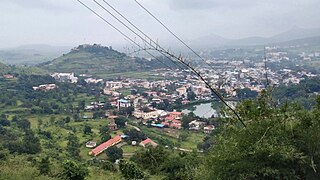
Trimbak is a city and a municipal council in Nashik District in the Indian state of Maharashtra. The Trimbakeshwar Shiva Temple is located here, one of the twelve Jyotirlingas, where the Hindu genealogy registers at Trimbakeshwar, Maharashtra are kept. The origin of the sacred Godavari River is near Trimbak.

Kukke Subramanya is a Hindu temple located in the village Subramanya, of Kadaba taluk in Dakshina Kannada district, Karnataka, India. In this temple Kartikeya is worshipped as Subramanya, lord of all serpents. The epics relate that the divine serpent Vasuki and other serpents found refuge under Subramanya when threatened by the Garuda. The priests in the temple are Shivalli Madhwa Brahmins. The poojas and other daily rituals in the temple are performed as per Madhvacharya's Tantra Sara Sangraha.
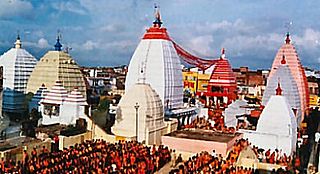
Baidyanath Temple, also known as Baba Baidyanath Dham, is a Hindu temple dedicated to Shiva. It is located in Deoghar, in the Santhal Parganas division of the Indian state of Jharkhand. The temple complex comprises the central shrine of Baba Baidyanath along with 21 additional temples. It is significant to the Hindu sects of Shaivism as this temple is referred to as one of the twelve Jyotirlingas.
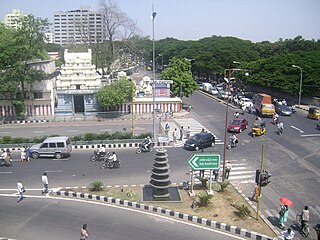
Madhya Kailash, also known as Nadukkayilai in Tamil, is a Hindu temple in South Chennai, located at the junction between Sardar Patel Road, Adyar and Rajiv Gandhi Salai. It is located opposite the Central Leather Research Institute and is close to the Indian Institute of Technology, Chennai.
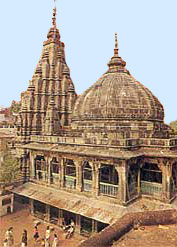
Vishnupad Temple is an ancient Hindu temple dedicated to Lord Vishnu in Gaya, Bihar, India, located on the banks of Phalgu river. The temple is believed to be built upon the site where Vishnu had purportedly killed the demon Gayasura or pinned him underground. The temple features a 40-cm footprint purported to be of Lord Vishnu incised into a block of basalt, known as Dharmasila which was retained when the deity stepped on Gayasura's chest before pinning him underground.

Barahachhetra is a Hindu and Kirat piligram site which remains between the confluence of Koka and Koshi rivers in Barahakshetra, Sunsari of Koshi Province, Nepal. This place is one of Nepal's oldest shrines mentioned in Puranas including Brahma Purana, Varaha Purana and Skanda Purana and even mentioned and glorified in the Mahabharata epic. In Barahachhetra, the Varah, an incarnation of Vishnu is worshiped. Barahachhetra is one of the Char Dham in Nepal.

Panch Prayag is an expression in Hindu religious ethos, specifically used to connote the five sacred river confluences in the Garhwal Himalayas in the state of Uttarakhand, India. The five prayags - prayaga meaning "place of confluence of rivers" in Sanskrit - also termed as "Prayag pentad" are Vishnuprayag, Nandaprayag, Karnaprayag, Rudraprayag and Devprayag, in the descending flow sequence of their occurrence.
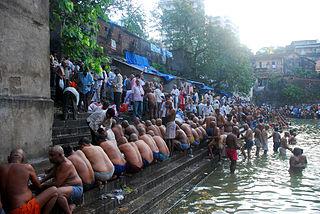
Pitru Paksha, also spelt Pitri Paksha, is a 16-lunar day period in the Hindu calendar when Hindus pay homage to their ancestors (Pitrs), especially through food offerings. The period is also known as Pitri Paksha/Pitr-Paksha, Pitri Pokkho, Sorah Shraddha, Kanagat, Jitiya, Mahalaya, Apara Paksha and akhadpak.

Shri Naimishnath Vishnu Temple, also known as the Naimishnath Devaraja temple or Naimishnarayan Temple or ramanujar kot Temple is a Hindu temple dedicated to Vishnu and lakshmi located in the north Indian state of Uttar Pradesh in naimisharanya town in sitapur district. It is one of the Divya Desams, the 108 temples of Vishnu revered in Nalayira Divya Prabandham by the 12 poet saints called the Alvars. The temple is believed to be of significant antiquity with contributions at different times from the ruling kings. The temple is counted as one of the eight temples of Vishnu that self-manifested and is classified as Swayamvyaktha Kshetra. The holy teerths Chankra Kunda and gomati river are associated with the temple and it is a pilgrimage centre where people take a holy dip during festive occasions.
Uttarakhand is a state in the northern part of India. It is often referred to as the "Devbhumi" due to its religious significance and numerous Hindu temples and pilgrimage sites found throughout the state. As a result, religious tourism forms a major portion of the tourism in the state. Uttarakhand is known for the natural environment of the Himalayas. 2019 Tourist Arrivals Domestic – 40,000,000 per/year and Foreigner – 150,000 per year. Tourism business in Uttarakhand generated ₹ 23,000 crores during 2013–14.
Putrada Ekadashi is a Hindu holy day, which falls on the 11th lunar day (ekadashi) of the fortnight of the waxing moon in the Hindu month of Pausha (December–January). This day is also known as Pausha Putrada Ekadashi, to differentiate it from the other Putrada Ekadashi in Shravana (July–August), which is also called Shravana Putrada Ekadashi. Couples fast on this day and worship the god Vishnu for a good son. This day is especially observed by Vaishnavas, followers of Vishnu. A son is considered entirely important in Hindu society as he takes care of the parents in their old age in life and by offering shraddha ensures well-being of his parents in the after-life. While each ekadashi is prescribed for certain goals, the goal of having sons is so great that two Putrada ekadashis are devoted to it. Rest of the goals do not enjoy this privilege.

Vallimalai is a village in Katpadi taluk of Vellore district, Tamil Nadu, India. It is located 30 kilometres (19 mi) from Vellore City and it is near Ponnai. It is known for Subramaniyar temple, a Hindu temple for Murugan.

